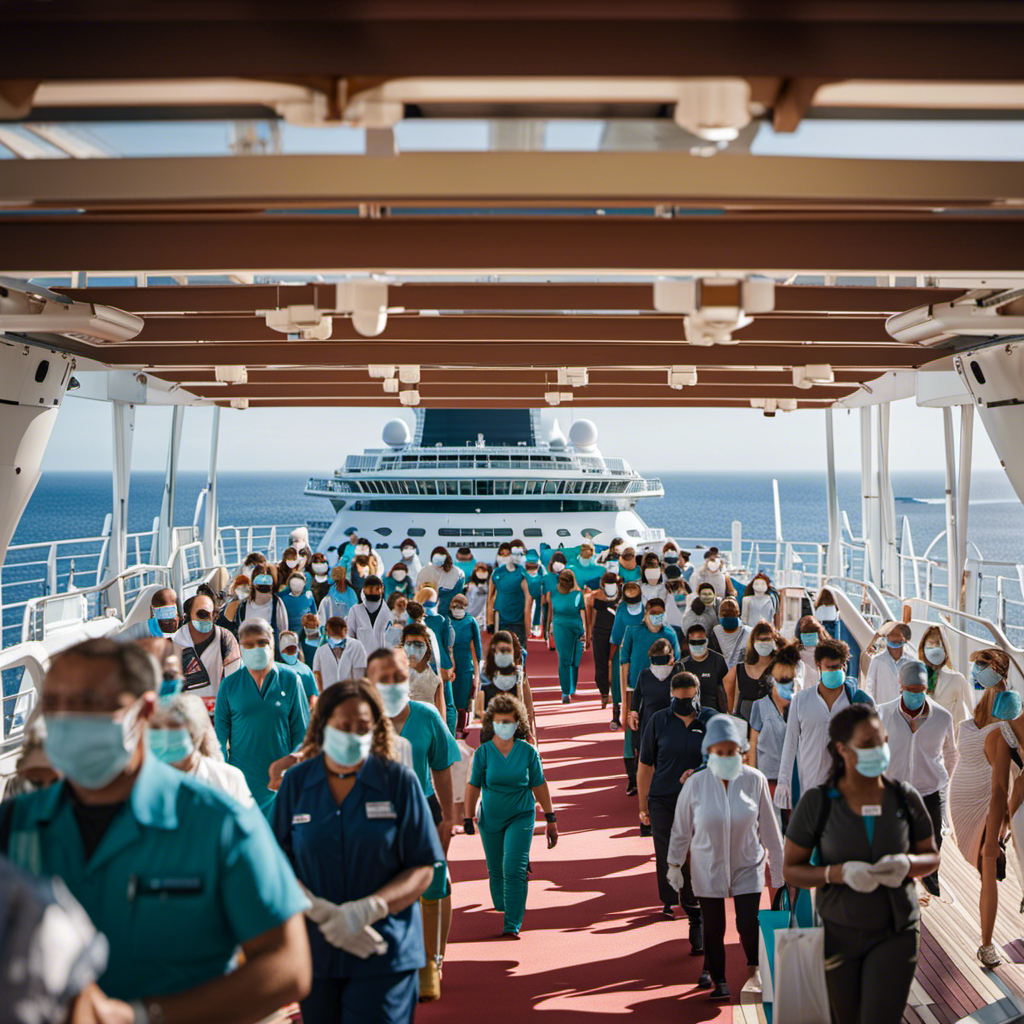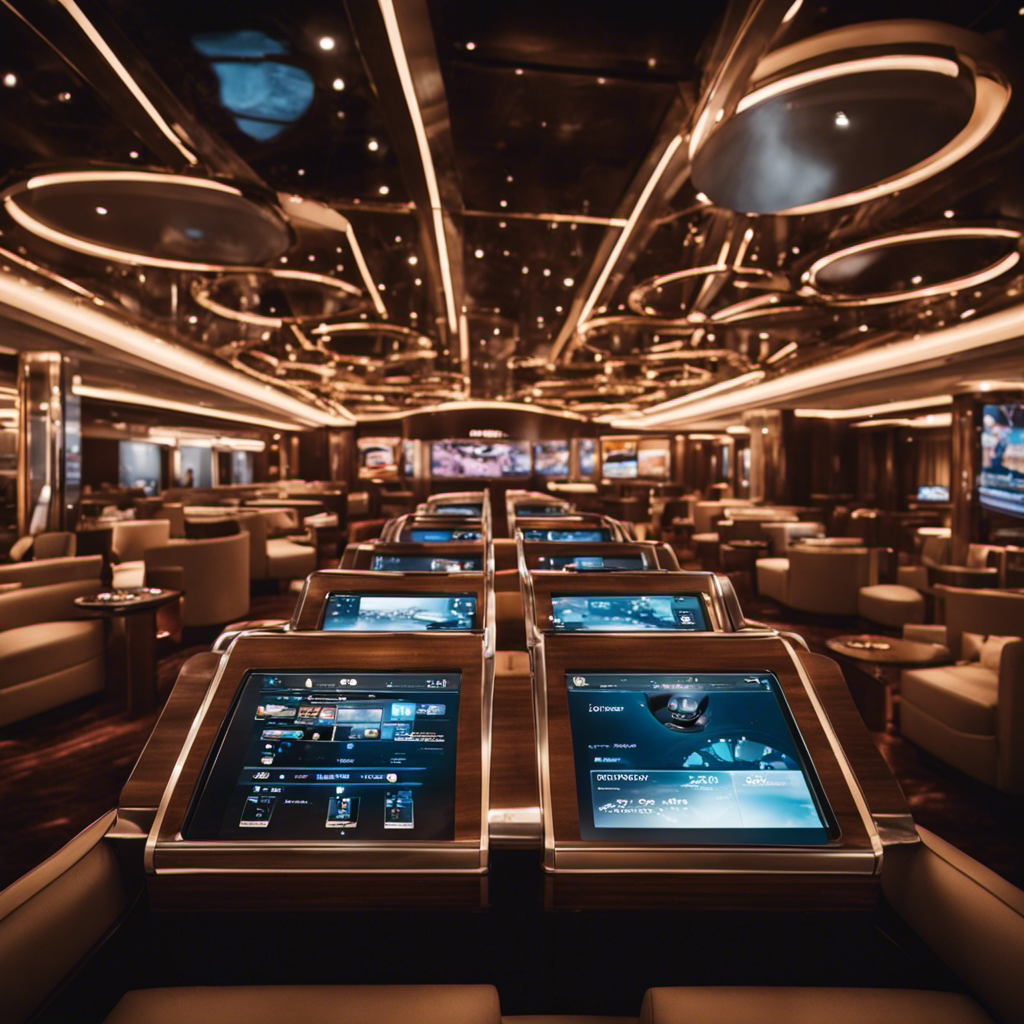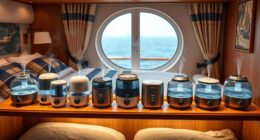As a cruise enthusiast, I’m eagerly anticipating the moment we can return to enjoying our voyages safely. However, the emergence of the Delta variant has raised concerns, leading cruise operators and the CDC to implement stringent safety protocols and testing requirements.
Vaccinated passengers must now test within two days of sailing, ensuring a safer environment on board. This new testing requirement is being implemented by Royal Caribbean, Carnival, Celebrity, and Princess, with Norwegian Cruise Line and Virgin Voyages already conducting universal testing at the port.
These measures reflect the industry’s commitment to passenger health and the containment of COVID-19.
Key Takeaways
- The Delta variant has led to a surge in COVID-19 cases on land, prompting cruise lines and the CDC to implement stricter protocols and testing requirements.
- Vaccinated passengers are now required to get tested within two days of sailing, with cruise lines like Royal Caribbean, Carnival, Celebrity, and Princess implementing this new requirement.
- Norwegian Cruise Line and Virgin Voyages already have universal testing at the port on embarkation day, while the CDC has adjusted rules to require a test no more than two days before the cruise for vaccinated passengers.
- Unvaccinated passengers (if allowed to sail) still have three days before the cruise to be tested. These measures are in response to the increased transmissibility of COVID-19 variants and breakthrough cases in vaccinated individuals.
The Importance of Strengthened Protocols for Cruise Travel
I believe that the implementation of stricter protocols and testing requirements for cruise travel is crucial to ensure the safety and well-being of passengers. With the rise of the Delta variant and its increased transmissibility, it is essential to take proactive measures to protect passengers from potential outbreaks onboard.
Exploring alternative travel options may seem tempting, but cruises can still be a safe and enjoyable experience with the right protocols in place. However, there are potential challenges in implementing stricter protocols. For example, enforcing testing requirements for all passengers, regardless of vaccination status, may require additional resources and coordination. It is also important to consider the impact on unvaccinated passengers and ensure that their needs are met while maintaining a safe environment for everyone.
Despite these challenges, the benefits of stricter protocols far outweigh the risks, as they help contain the spread of COVID-19 and provide peace of mind to passengers.
Understanding the Updated Testing Requirements for Cruise Passengers
Masks are now mandatory in many indoor areas for fully vaccinated passengers on cruises. This is part of the strengthened protocols and testing requirements implemented by cruise lines and the CDC. These measures aim to contain the spread of COVID-19 and ensure passenger health.
However, these new requirements have had an impact on cruise bookings. Some potential passengers may be hesitant to book a cruise due to the vaccination requirements. This has led to a decrease in bookings for cruise lines, resulting in financial implications for the industry.
Additionally, the new testing protocols, which require all passengers to be tested regardless of vaccination status, have added to the financial burden for cruise lines. The cost of implementing these protocols, including testing supplies and staffing, can be significant.
Cruise lines are carefully analyzing the financial implications and adjusting their strategies to navigate these challenges.
Cruise Lines’ Implementation of Stricter Health Protocols
Passengers are now required to show proof of vaccination before boarding the cruise ship. The cruise industry has implemented stricter measures to ensure the safety of passengers and crew members. These adjustments include mandatory testing for all passengers, regardless of vaccination status.
Masks are now required in many indoor areas, even for fully vaccinated cruisers. The Bahamas has also implemented a vaccination requirement for cruise passengers aged 12 and older. Cruise lines such as Royal Caribbean, Carnival, Celebrity, and Princess have implemented new testing requirements, while Norwegian Cruise Line and Virgin Voyages already have universal testing at the port on embarkation day.
These stricter health protocols on cruises aim to contain the spread of COVID-19 and limit breakthrough cases. The cruise industry continues to adjust its protocols to ensure the health and well-being of all passengers.
Navigating the Impact of the Delta Variant on Cruise Travel
Navigating the impact of the Delta variant on cruises has become increasingly challenging as cases continue to rise on land. The cruise industry is working diligently to address public concerns and implement stricter protocols to ensure passenger safety. One of the major challenges is navigating testing requirements. To make the information more relatable, here is a table that summarizes the current testing requirements implemented by various cruise lines:
| Cruise Line | Testing Requirement |
|---|---|
| Royal Caribbean | Vaccinated passengers must test within two days of sailing |
| Carnival | Vaccinated passengers must test within two days of sailing |
| Celebrity | Vaccinated passengers must test within two days of sailing |
| Princess | Vaccinated passengers must test within two days of sailing |
| Norwegian Cruise Line | Universal testing at the port on embarkation day |
| Virgin Voyages | Universal testing at the port on embarkation day |
These requirements have been adjusted recently by the CDC due to the increased transmissibility of COVID-19 variants and breakthrough cases in vaccinated individuals. In addition to testing, cruise lines have also implemented stricter masking and vaccination protocols to contain the spread of the virus. It is important to note that cruising has more stringent health protocols compared to other forms of travel. As the Delta variant continues to pose challenges, the industry may further tighten testing requirements in the future. By addressing these testing challenges and public concerns, cruise travel can become safer and more enjoyable for passengers.
Examining the Effectiveness of Vaccination, Testing, and Masking on Cruise Ships
Personally, I have noticed the effectiveness of vaccination, testing, and masking on cruise ships in containing the spread of COVID-19. Here are four key points to consider:
-
Vaccination requirements: Cruise lines like Royal Caribbean, Carnival, Celebrity, and Princess now require vaccinated passengers to test within two days of sailing. This helps ensure that those on board are protected and less likely to transmit the virus.
-
Testing protocols: Both vaccinated and unvaccinated passengers are required to undergo testing before embarking on a cruise. This additional layer of screening helps identify any potential cases and prevents the virus from spreading further.
-
Masking regulations: Masks are now mandatory in many indoor areas on cruise ships, even for fully vaccinated passengers. This precautionary measure further reduces the risk of transmission and provides an extra level of protection for everyone on board.
-
Impact on cruise travel: The implementation of vaccination and testing requirements has had a significant impact on cruise travel. While these measures may add some inconvenience, they are crucial in ensuring the safety and well-being of passengers and crew members.
Overall, the effectiveness of masking, vaccination, and testing on cruise ships has played a vital role in containing the spread of COVID-19 and allowing for safer travel experiences.
The Role of Testing in Containing COVID-19 Spread on Cruise Ships
I have observed that testing plays a crucial role in containing the spread of COVID-19 on cruise ships. The efficacy of rapid testing on cruise ships has been instrumental in identifying and isolating potential cases before they have a chance to spread.
The impact of testing requirements on cruise ship operations has been significant but necessary. Cruise lines have implemented strict testing protocols to ensure the safety of passengers and crew members. Vaccinated passengers are now required to test within two days of sailing, while unvaccinated passengers have three days before the cruise to be tested.
These measures have proven effective in limiting the number of reported cases on cruise ships. The protocols will remain in place as long as COVID-19 is present to ensure passenger health and contain potential spread. The use of testing has become essential in maintaining a safe and healthy environment onboard cruise ships.
The Bahamas’ Vaccination Requirement for Cruise Passengers
The Bahamas now mandates that cruise passengers aged 12 and older must be vaccinated. This new vaccination requirement for cruise passengers has had a significant impact on the tourism industry in The Bahamas.
The implementation of this policy is aimed at ensuring the safety and well-being of both passengers and locals. To enforce this requirement, cruise passengers are required to provide proof of vaccination before boarding the ship. This vaccination verification process involves presenting their vaccination card or a digital vaccine passport.
The Bahamas’ vaccination requirement for cruise passengers has been a crucial step in preventing the spread of COVID-19 and protecting the health of all individuals involved in the cruise industry. By implementing this policy, The Bahamas is demonstrating its commitment to maintaining a safe and secure environment for tourists and locals alike.
Evolving Protocols: From Allowing Unvaccinated Passengers to Mandatory Vaccination
Implementing stricter vaccination measures has become necessary due to the evolving situation and increasing cases of COVID-19. Here are three key points to consider:
-
Mandatory Vaccination: Cruise lines are now requiring all passengers to be vaccinated, regardless of their age. This measure aims to ensure the safety and well-being of everyone on board and reduce the risk of COVID-19 transmission.
-
Effectiveness of Vaccination: Vaccines have proven to be highly effective in preventing severe illness, hospitalization, and death from COVID-19. By mandating vaccination, cruise lines are taking a proactive approach to protect their passengers and crew members.
-
Impact of Unvaccinated Passengers: The presence of unvaccinated passengers can potentially increase the risk of COVID-19 outbreaks on board. Therefore, cruise lines have made the decision to limit or exclude unvaccinated individuals from sailing to maintain a safer environment for everyone on board.
These stricter vaccination measures are crucial in ensuring the safety of passengers and minimizing the impact of COVID-19 on cruise travel.
Ensuring Passenger Health: Why Protocols Will Remain in Place
Maintaining passenger health is crucial, which is why these protocols will remain in place to ensure safety and prevent the potential spread of COVID-19.
While stricter protocols for cruise travel may have their pros and cons, they play a vital role in safeguarding the well-being of passengers.
The impact of these protocols on passenger confidence and cruise bookings cannot be overlooked. On one hand, stricter protocols provide reassurance to travelers, instilling a sense of security and peace of mind. Passengers can feel more confident knowing that cruise lines are taking extra precautions to prioritize their health and safety.
On the other hand, some individuals may find the stricter protocols inconvenient or restrictive. However, it is essential to understand that these measures are in place to protect everyone onboard and minimize the risk of COVID-19 transmission.
Ultimately, by implementing and maintaining these protocols, cruise lines can rebuild passenger confidence, leading to increased bookings and a stronger recovery for the industry.
The Future of Testing Requirements for Cruise Travel
As we continue to navigate the challenges presented by the COVID-19 pandemic, the future of testing requirements for cruise travel is a topic of great importance. Cruise lines and health authorities are constantly evaluating and updating protocols to ensure the safety of passengers and crew members. The aim is to further enhance safety measures and minimize the risk of transmission onboard.
One potential future testing requirement that may be implemented is universal testing for all passengers on embarkation day, similar to the policy already in place for Norwegian Cruise Line. This would provide an additional layer of protection and help identify any potential cases before boarding the ship.
These future testing requirements are part of an ongoing effort to improve safety measures and ensure that cruise travel remains a safe and enjoyable experience for all. By implementing stricter testing protocols, cruise lines are taking proactive steps to protect the health and well-being of their passengers and crew members.
Frequently Asked Questions
Is There a Specific Threshold for the Number of Cases on a Cruise Ship That Would Trigger Stricter Protocols or Potential Cancellation of the Cruise?
If the number of COVID-19 cases on a cruise ship reaches a specific threshold, stricter protocols may be implemented or the cruise could potentially be canceled. Passenger compliance, communication, and enforcement are crucial in these situations.
How Are Cruise Lines Ensuring the Accuracy and Reliability of the COVID-19 Tests Conducted on Passengers?
Ensuring accuracy and reliability of COVID-19 tests is crucial. Cruise lines employ strict measures, including certified labs, trained personnel, and regular quality checks. We prioritize passenger safety by maintaining high standards and following protocols.
Are There Any Exceptions or Exemptions to the Vaccination Requirement for Cruise Passengers, Especially for Those Who Are Unable to Be Vaccinated Due to Medical Reasons?
There are no exemptions to the vaccination requirement for cruise passengers, but alternative options may be available for those who are unable to be vaccinated due to medical reasons.
Are There Any Penalties or Consequences for Passengers Who Do Not Comply With the Testing or Masking Requirements on Cruise Ships?
There are penalties and consequences for passengers who do not comply with the testing or masking requirements on cruise ships. Non-compliance can result in denied boarding, removal from the ship, or other disciplinary actions.
How Are Cruise Lines Communicating and Enforcing the New Protocols and Requirements to Passengers Before Their Sail Date?
Cruise lines communicate and enforce new protocols by providing clear instructions and updates through email, onboard announcements, and their websites. They may also utilize signage, staff reminders, and consequences for non-compliance to ensure passenger awareness and adherence to the requirements.
Claire, a creative soul with an unquenchable thirst for storytelling, is an integral part of the Voyager Info team. As a dedicated writer, she weaves captivating narratives that transport readers to enchanting cruise destinations and beyond.
Claire’s love affair with writing began at an early age when she discovered the magic of words and their ability to craft worlds and emotions. Her innate curiosity led her to explore various literary genres, but it was travel writing that truly captured her heart. Drawing inspiration from her own globetrotting adventures and encounters with diverse cultures, Claire embarked on a journey to become a travel writer par excellence.











